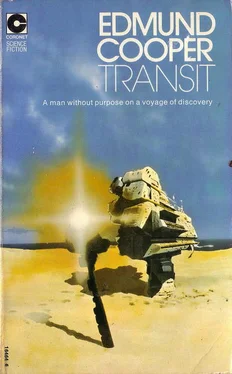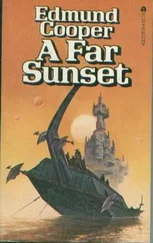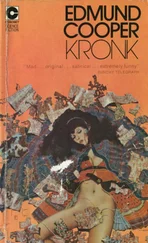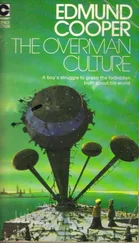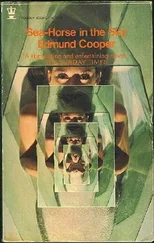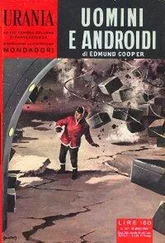The machine was not amused. It is necessary for you to answer further questions, it sent back primly. Your cooperation will be appreciated.
Barbara was about to punch out a further message of defiance, but Avery said: ‘Let it play by itself. I think the general idea has got across.’
Barbara sighed. ‘You’re the captain. But I like being childish. It improves my morale.’
There was a few seconds of silence, during which they both gazed about them apprehensively as if retaliation might leap out at them from the walls or from the illuminated ceiling. But nothing happened, and they were left with a feeling of anticlimax.
‘It looks as if they’re thinking it over,’ suggested Avery. ‘Normally they seem to respond pretty quickly.’
‘Maybe they haven’t had a case like this before.’ Barbara sounded more flippant than she felt.
‘Well, let’s try to forget about them for a bit, otherwise the waiting will get on our nerves…. Now where was I?’
‘Otherness—that’s where you were.’
‘Yes,’ he said, ‘otherness is the right word, I think.
We don’t belong, the situation doesn’t belong—it’s unreal, somehow not properly human.’
‘Inhuman?’
‘Perhaps, but not in the ordinary sense. Non-human is better. For example, I wouldn’t be at all surprised if we were using that thing,’ he gestured to the teletypewriter, ‘to communicate with a computer. And a not very flexible computer at that.’
‘I have an odd conviction that it wasn’t a computer that snatched me out of Hyde Park,’ objected Barbara.
‘Maybe, but ’ Avery got no further.
At that moment the wall panel slid back. Instinctively, they both looked to see what the recess contained. Their attention was immediately drawn to one tiny object.
It was a crystal, flawless and beautiful, brilliant and blinding. It was a crystal of pure light containing the mystery of absolute darkness.
He was invisible. He was no more than a wisp of thought and feeling in the empty garden of creation. He was a rustle of wind through the alleyways of time, a moment of sadness in the long tremendous joy of unbeing. He was nothing and everything. He was alone.
Yet not alone.
Christine swam towards him through the stars. And the stars became the leaves of autumn, brown and gold, whipped to dancing on the crest of unheard music. And a whole lost world throbbed back into existence—a world that was young and green with living.
Christine whispered: ‘Wherever you are, whatever you do, my dear one, I am part of it. For what is between us is above time and place and life and death…. There is a journey to be made, my darling. Make it. There is a dream to be dreamt, a faith to be kept, a challenge to be taken. Our love is part of the dream, the faith, the challenge. Make of it something new. Make it bright and glorious. Give it freedom.’
He wanted to speak: but an invisible eye, a wisp of thought, a rustle of wind has no voice. He wanted to say: ‘Christine! Christine! You and you only. Nothing else. Not living or loving, not journeying or creating. But you and you only….’
That is what he wanted to say; but there were no words. They would not form in the darkness. They would not pass through the black backcloth between desiring and knowing.
Christine dissolved, and there was emptiness only.
But the emptiness filled with the great green eye of a planet. It stared at him. It stared like a woman who knows she is fair. It stared like an animal waiting to conquer or be tamed.
‘This,’ said the voice, ‘is home. This is the garden. This is the world where you will live and grow and understand. This is where you will discover enough but not too much. This is where life is. It is yours.’
He had heard the voice before. He had heard the words before. But he did not understand the message.
He was afraid. Afraid because he did not understand. Afraid because he knew there was too much and too little to understand. Afraid because he was alone, and the loneliness was deeper than pain—
Avery woke. There was sweat on his forehead.
He was lying neatly—too neatly—on the bed, arms by his side, like a patient coming out of anaesthetic. He remembered the last time, and sat up slowly. The throbbing in his head was not too bad.
He looked round. Barbara had disappeared, the wall had returned and he was once more in solitary confinement. He smiled weakly, thinking of the thoughts that Barbara would be thinking, the words she would doubtless be arranging in attractively unladylike profanities.
The panel was still open, but there was no crystal in the recess. Only a single sheet of paper. And a pencil.
‘So much for passive resistance,’ thought Avery. He ought to have realized that the crystal would be used. It was just too easy.
He took the pencil and paper to his table, sat down and looked at the questions. No intelligence test this time. Something rather more personal. Fortunately, it was mostly yes-or-no stuff. And there wasn’t much of it.
Do you believe in God, as a person whose ethic may be interpreted by men? He wrote: No.
Do you believe that the end justifies the means? He wrote: Sometimes it does: sometimes it doesn’t.
Do you desire immortality? He wrote: No.
Do you think you are courageous, more than normally courageous or a coward? He wrote: A coward.
Does your present situation cause stress? He wrote: Don’t be stupid.
Would you be willing to die for an ideal? He wrote: I don’t know.
Do you think that men are superior to animals? He wrote: Only in some things.
Are you sexually potent? He wrote: I believe so.
What do you fear most? He wrote: Insanity.
Do you think that warfare can be justified? He wrote:
Sometimes.
Have you ever committed murder? That, thought Avery, was a peach of a question. He wrote: I don’t think so.
Have you ever killed anyone? The imagined faces of three nameless airmen loomed sharply and briefly in his consciousness. He wrote: Yes.
Whom, if anyone, do you love? Feeling like a traitor, Avery wrote: Myself.
That was the lot. He glanced through his answers, then returned the paper to the recess. Presently the panel closed.
He went to the inscrutable typewriter and tapped out: Now will you move that blasted wall again?
Back came the answer: Very soon. Please be patient.
Avery lit a cigarette and began to pace up and down. The situation was getting more and more fantastic. The most annoying thing seemed to be that he was completely robbed of initiative. They were having it all their own way; and that he resented bitterly.
Back once more to the question of who they were: answer—there was no answer…. But there had to be! And Avery was acutely aware of the mental barrier separating rational thought from irrational conviction. To hell with rational thought, he told himself irritably. Rational thought was no good for a situation like this. Only the irrational would do—and probably even that wasn’t good enough.
Out with it then! Out with the bloody stupid conviction that has been building up at the back of your mind like water behind a dam.
Avery took a deep breath and said it aloud. ‘They’re not human beings at all. They are bloody bug-eyed monsters.’
The words exploded in the quietness of the room, seemed to echo thunderously from the metal walls.
And at that moment, as if at a signal, the wall that had separated him from Barbara disappeared. Only this time it was not Barbara on the other side. It was someone else.
Читать дальше
